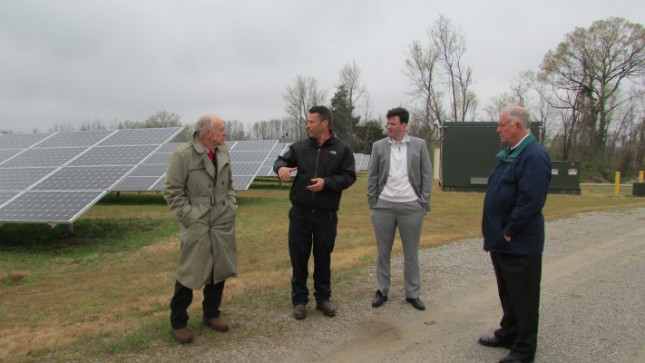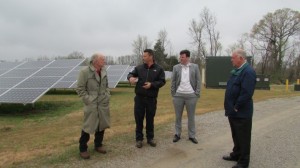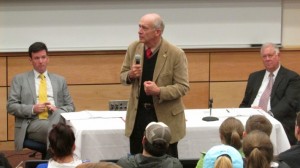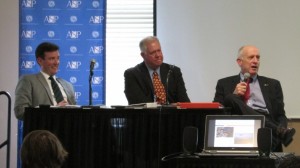
ASP in Tennessee: Climate Change Threatens Security
Podcast: Play in new window | Download
Subscribe: Apple Podcasts | RSS
On Monday and Tuesday, April 7 and 8, representatives of the American Security Project visited Western and Central Tennessee for a series of meetings, public events, and briefings on how climate change is affecting security, and how businesses are planning for it.
Attending were LtGen John “Glad” Castellaw, USMC (ret.) and Brig. General John Adams, USA (Retired). Castellaw was a 36 year veteran of the Marine Corps and now serves as the Director of the Crockett Policy Insititute and a member of the ASP Board. Adams is a 30 year veteran of the Army, is completing his Doctorate in International Relations, and is the President of Guardian Six Consulting LLC. Both are members of ASP’s Consensus for American Security. Andrew Holland, ASP’s Senior Fellow for Energy and Climate, and Porter Brockway, ASP’s events manager, rounded out the delegation.
 The first appointment of the tour was to meet with representatives of FedEx at Memphis Airport to discuss the energy and environmental challenges that the company faces, and efforts they are taking to mitigate those challenges. We agreed that a large portion of the event would be off the record in order to have a more open discussion, but there are certain parts that can be reported.
The first appointment of the tour was to meet with representatives of FedEx at Memphis Airport to discuss the energy and environmental challenges that the company faces, and efforts they are taking to mitigate those challenges. We agreed that a large portion of the event would be off the record in order to have a more open discussion, but there are certain parts that can be reported.
The visit started with a tour through the FedEx sorting facility – a place that has about 10,000 employees per day. As we toured on Monday morning, we saw the facility the only time that it is quiet – as there is no pickup on Sundays and packages picked up from Monday had not yet arrived. Repeatedly throughout the meeting, we returned to this theme: greater investment in energy efficiency and reduced energy use has co-benefits to overall productivity and profits for FedEx. After the tour around the facility, ASP moved inside to meet with executives and leaders or FedEx’s “Practical Sustainability” initiatives. We went through their efforts on biofuels, flight fuel management, and ground transport efficiency. For a full discussion of FedEx’s work, see this (forthcoming) article. Overall, the theme was clear: as FedEx has invested in clean energy, its environmental footprint has gone down while revenues and profits have continued to climb.
 After leaving FedEx, ASP drove to the West Tennessee Solar Farm, an initiative of the University of Tennessee to provide 5 MW of solar power to the electricity grid. Taking up more than 25 acres, the approximately 21,000 fixed photovoltaic solar panels provide electricity as one of the largest solar arrays in the Southeast. ASP met with Elliot Barnett, the facility manager, who discussed the history of the facility. While the facility provides important electrical power, its purpose is also as an educational destination. Built within easy view of Interstate 40, the Tennessee Department of Transportation is building an off-ramp and visitors center that will allow travelers to see and learn about solar power and renewable energy. There is room to expand, and the facility could one day host a variety of renewable energy production.
After leaving FedEx, ASP drove to the West Tennessee Solar Farm, an initiative of the University of Tennessee to provide 5 MW of solar power to the electricity grid. Taking up more than 25 acres, the approximately 21,000 fixed photovoltaic solar panels provide electricity as one of the largest solar arrays in the Southeast. ASP met with Elliot Barnett, the facility manager, who discussed the history of the facility. While the facility provides important electrical power, its purpose is also as an educational destination. Built within easy view of Interstate 40, the Tennessee Department of Transportation is building an off-ramp and visitors center that will allow travelers to see and learn about solar power and renewable energy. There is room to expand, and the facility could one day host a variety of renewable energy production.
 From there, ASP drove to Martin, TN for a public event at the University of Tennessee in Martin. Hosted by Malcom Koch of the International Education program, the event drew over 100 students, faculty, and community members to the discussion. Generals Castellaw and Adams discussed how climate change is going to change the operating environment for the military, and discussed some of the threats that poses. After their presentations, there was important questions and answers from the Audience. UT Martin is a school that specializes in agriculture, so a focus of some questions was on how climate change is going to alter the ability of Tennessee and the world to produce food. A full video of the event is forthcoming.
From there, ASP drove to Martin, TN for a public event at the University of Tennessee in Martin. Hosted by Malcom Koch of the International Education program, the event drew over 100 students, faculty, and community members to the discussion. Generals Castellaw and Adams discussed how climate change is going to change the operating environment for the military, and discussed some of the threats that poses. After their presentations, there was important questions and answers from the Audience. UT Martin is a school that specializes in agriculture, so a focus of some questions was on how climate change is going to alter the ability of Tennessee and the world to produce food. A full video of the event is forthcoming.
The following day, ASP drove to Nashville for a meeting with the Tennessee Valley Authority (TVA) to discuss their energy security and sustainability initiatives. TVA is a unique entity, in that it is a federally-owned enterprise that is that also acts as a commercial entity. It was chartered in 1933 to provide flood control, electricity generation, and economic development to the Tennessee River Valley. TVA’s service region covers most of Tennessee, plus some parts of the adjoining states of Alabama, Mississippi, Virginia, Georgia, and Kentucky.
TVA, as a part of the federal government, has an active role in the Climate Action plan to both reduce greenhouse gas emissions and to prepare for the effects of climate change. On the first order, TVA is reducing emissions through the retirement of old coal power plants, increasing its share of nuclear generating capacity, increasing the share of generation from natural gas power plants, and increases in energy efficiency. By 2020, TVA forecasts that they will reduce CO2 emissions by 40% below 2005 levels. By 2012, TVA had already reduced these emissions to 23% below 2005 levels.
In preparing for the effects of climate change, TVA is investing in thermal power plants that have more of a closed-loop cooling system, so that warmer river waters do not force a shutdown of generation. They are making the grid more resilient to extreme weather by widening the rights of way for transmissions lines. Overall, TVA believes that the best way for a utility to be resilient to future climate changes is to have a balanced portfolio of generating capacity, which includes renewables, nuclear, coal, and natural gas. As was the case throughout the tour, TVA made clear that current investments now would pay off in both environmentally and in increased profits.
 The final event took place a Belmont University in Nashville. ASP spoke to a group of about 50 students about how climate change was impacting national security. The audience was interested and engaged in the topic – several questioners were veterans or ROTC members who asked specific questions about how the military is preparing for climate change. Click below to listen to the full audio of the event.
The final event took place a Belmont University in Nashville. ASP spoke to a group of about 50 students about how climate change was impacting national security. The audience was interested and engaged in the topic – several questioners were veterans or ROTC members who asked specific questions about how the military is preparing for climate change. Click below to listen to the full audio of the event.
The full two days were important because it underscored both the threats that climate change pose to national security and to states like Tennessee and the opportunities that businesses, students, and the government have in preparing for a changed world. As this tour showed, preparing for climate change – either by reducing emissions or increasing resilience – can be a real “win-win.” Those who present climate change as only a cost are presenting a false choice – and no one knows that better than the military. We can increase mission effectiveness and reduce the footprint at the same time: Tennessee can help lead the way.





